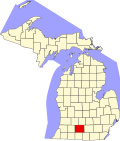Capitol Hill School | |
 | |
| Location | 603 Washington St., Marshall, Michigan |
|---|---|
| Coordinates | 42°15′52″N84°57′7″W / 42.26444°N 84.95194°W |
| Area | less than one acre |
| Built | 1860 |
| Built by | E.O. Crittenton |
| Architect | Sheldon Smith |
| Architectural style | Gothic Revival |
| NRHP reference No. | 72000598 [1] |
| Added to NRHP | March 16, 1972 |
The Capitol Hill School is a former school building located at 603 Washington Street in Marshall, Michigan. It was listed on the National Register of Historic Places in 1972. [1] It is currently used as a museum.
